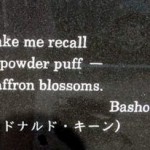Consider Reflection & Haiku
“Consider Reflection & Haiku”
After reading “Consider” this week I must agree with Seth Godin in his statement regarding this book, “While the world seems to want you to go ever faster…it actually rewards you for being insightful and for doing work with meaning. I know it’s hard to slow down to read this, but you should.” (front cover)
Not only does Forrester convince us that reflection is necessary in order to think straight but also a vital element needed in making decisions that positively affect others. In addition, he shares the reflection habits of several world leaders. He explains that we must carve out think time. We must develop attention over the distraction of social media and meaning over data. He expresses President Barack Obama’s idea that “…information becomes a distraction, a diversion, a form of entertainment, rather than a tool of empowerment, rather than the means of emancipation.” (12) After every interruption there is necessary wasted time he calls “recovery time.” When we constantly bombard ourselves with 20 second bits of information from Facebook streams and Twitter tweets we are marinating in conventional wisdom and making it impossible to create our own thoughts. Jeff Hoff, one of the founders of Priceline.com, during his “wonder time” plots data points based on Google Trends or Yahoo Top Searches tabs. “He wonders what the words can tell him about what is happening, and if the data points can be added together over time and create new meaning.” (48) Joshua Bell, violinist, slows down, naps and focuses before big concerts so that he can concentrate when playing difficult classical pieces. Thad Allen, point person for addressing the Katrina disaster also, “used his fleeting moments of reflection (again on planes, helicopter rides, and often in the early morning) to help him frame descriptions of the aftermath of the Deepwater Horizon oilrig explosion.” (22) Forrester gives many more examples of how great leaders took time to reflect and assess situations in order to be successful. He employs us to do the same. Here’s an example of how I ushered this concept into my World Religions class today.
This morning, after discussing the Japanese indigenous tradition/religion of Shinto, I led my students in an outdoor reflection activity. On a sheet of paper they wrote: I See… I Hear… I Smell… I Taste… I Touch… I Feel… I Know… As a group we stepped outside of the classroom and they found an area in the grass, by a tree or on a bench where each one could engage in the present moment and write. What did they see? What did they hear? After this we gathered into a circle and discussed our writings. I asked each of them to share something. One of the most unique responses I heard was, “I feel all four seasons on my skin.” Wow! Others shared that they felt refreshed and focused, and knew they were going to have a good day. We then moved back into the classroom where we wrote a haiku as a class and then they found a partner and wrote a haiku together. They will be sharing these on Friday with the class.
I can’t agree with Forrester more when he explains that reflection is “…where space is given for the ‘totally unexpected’ to emerge.” (18) I am looking forward to hearing the haiku poetry that blossomed from my students’ time of reflection outdoors. Here’s one of the haikus I wrote this morning during this time:
“Warm sun on my toes
Bird chirping on the tree branch
What’s that feeling? Hope.”
Do you carve out a think and reflection time? What is one thing that works best for you during this time?
Forrester, Daniel Patrick. Consider: Harnessing the Power of Reflective Thinking in Your Organization . New York, NY. Palgrave Macmillan, 2011

Leave a Reply
You must be logged in to post a comment.